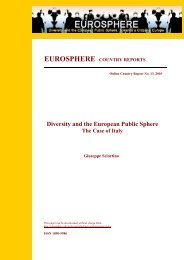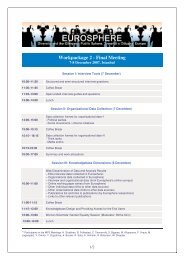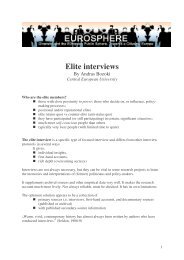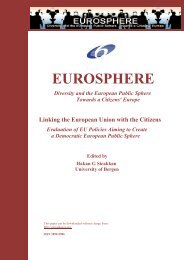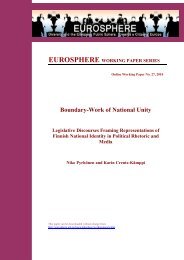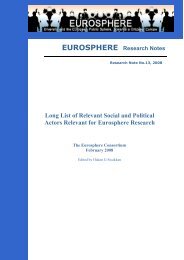Migrants, Minorities, Belongings and Citizenship. Glocalization and ...
Migrants, Minorities, Belongings and Citizenship. Glocalization and ...
Migrants, Minorities, Belongings and Citizenship. Glocalization and ...
You also want an ePaper? Increase the reach of your titles
YUMPU automatically turns print PDFs into web optimized ePapers that Google loves.
Table 10. Categorical Regression Analysis of Mobility of Minds Pattern 2 (Group vs. Time<br />
references)<br />
St<strong>and</strong>ardized<br />
Coefficients<br />
Beta<br />
Sig.<br />
Importance<br />
Local <strong>and</strong> Domestic<br />
Mobility<br />
,002 ,000 ,000<br />
Cross-country Mobility 1,000 ,000 1,000<br />
Participation in All Spaces ,002 ,000 ,000<br />
Participation in<br />
Essentialized Spaces<br />
versus Glocal Spaces<br />
,002 ,000 ,000<br />
*** Dependent Variable: Mobility of Mind - Group vs. Time References (Multiple-R:1, R-<br />
square:1)<br />
Table 15 shows that cross-country mobility is associated with increased mind-mobility<br />
between group references whereas it implicates decreased mind-mobility between<br />
different time references (this dimension is bipolar <strong>and</strong> its small <strong>and</strong> large values have<br />
different meanings). Amongst the four variables included in the analysis in Table 15,<br />
variable “cross-country mobility” is the dominant explanatory factor. This implies that<br />
cross-country mobility can be a relevant factor if the aim is to increase individuals’<br />
allegiance to groups other than their own groups. However, as the dependent variable<br />
should be interpreted in a bipolar way, it is also important to note that cross-country<br />
mobility leads to a decrease in individuals’ ability to identify with multiple timereferences.<br />
This may mean, for example, that it may be difficult for an individual to<br />
identify with a future “Europe” project although that individual has a high level of mindmobility<br />
with respect to group-identification references.<br />
Therefore, within the limited frame of our small qualitative sample, the result here is that<br />
increased “cross-country mobility” means increased “mobility of mind between collective<br />
identification references”. However, based on the in-depth analyses of the data, this does<br />
not mean that people with high mental mobility between group references necessarily<br />
stop identifying with their own groups, but most adopt a more impartial <strong>and</strong> egalitarian<br />
attitude towards other groups’ members. Therefore, the higher the degree of crosscountry<br />
mobility, the higher the degree of mobility of mind between references of group<br />
(collective) identification.<br />
84



